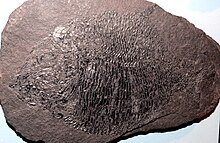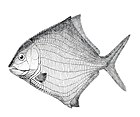Platysomus
Jump to navigation
Jump to search
| Platysomus Temporal range:
| |
|---|---|

| |
| Platysomus gibbosus | |
| Scientific classification | |
| Domain: | Eukaryota |
| Kingdom: | Animalia |
| Phylum: | Chordata |
| Class: | Actinopterygii |
| Order: | †Platysomiformes |
| Family: | †Platysomidae |
| Genus: | †Platysomus Agassiz, 1833 |
| Type species | |
| †Platysomus striatus Agassiz, 1833
| |
| Other species | |
| |
| Synonyms | |
| |


Platysomus (from Greek: πλατύς platys, 'broad' and Greek: σῶμα sôma 'body')[1] is an extinct genus of ray-finned fish that lived in the Carboniferous and Permian periods. Fossils have been found worldwide.
Platysomus was about 18 centimetres (7.1 in) long, and shaped similarly to the discus fish, having the same flattened body and elongated dorsal and anal fins. Its jaws were placed vertically under the braincase, giving it a wide gape. Platysomus is thought to have fed on plankton, and lived in both fresh and salt water.[2]
References
- ^ Roberts, George (1839). An etymological and explanatory dictionary of the terms and language of geology. London: Longman, Orme, Brown, Green, & Longmans. p. 135. Retrieved 30 December 2021.
- ^ Palmer, D., ed. (1999). The Marshall Illustrated Encyclopedia of Dinosaurs and Prehistoric Animals. London: Marshall Editions. p. 35. ISBN 1-84028-152-9.
Categories:
- Articles with short description
- Short description is different from Wikidata
- Articles with 'species' microformats
- Articles containing Greek-language text
- Palaeonisciformes
- Prehistoric ray-finned fish genera
- Carboniferous bony fish
- Permian bony fish
- Paleozoic fish of Europe
- Paleozoic fish of North America
- Taxa named by Louis Agassiz
- All stub articles
- Prehistoric ray-finned fish stubs







